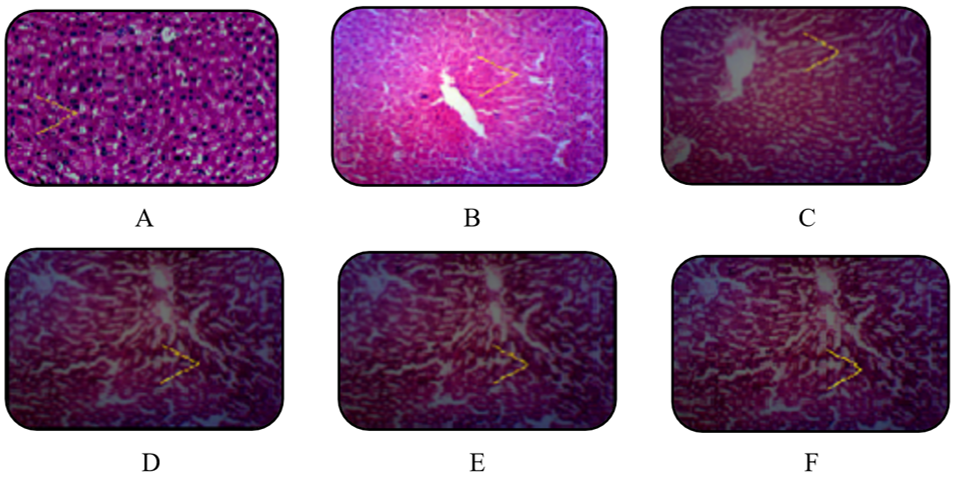Effects of aqueous leaves extract of Aloe barbadensis on blood glucose levels of streptozocin-induced diabetic Wistar rats
Abstract
The study was to investigate the antidiabetic of aqueous extract of leaves of plant Aloe barbadensis. In STZ induced diabetes in rats, a study was conducted on six groups of six male Wister rats each to evaluate the hypoglycaemic effect. Diabetes was induced in rodents by intravenous (i.v) infusion of STZ at a portion of 50 mg/kg body weight, disintegrated in 00.10M virus citrate cushion (pH = 04.50). Blood glucose level was estimated utilizing GOD-POD (Kit spin react). Blood tests were pulled back from the retro-orbital plexus under light ether. A. barbadensis (ALEC) was exposed to hostile to diabetic action in rodents where STZ was utilized as a portion of 120 mg/kg in intraperitoneal portion as a diabetogenic specialist to an acquainted diabetic with test rodents. In intense streptozotocin prompted models fasting blood glucose level was recorded on multi-day as basal worth 4th, 7th and 10th day. Aqueous extracts of leaves of A. barbadensis at portion 250 and 500 mg/kg showed portion subordinate critical enemy of hyperglycemic action on 4th, 7th and 10th day post-treatment. ALEC portion of 100 mg/kg likewise caused a decrease in blood glucose level; however, outcomes were found factually non-noteworthy. The Antihyperglycemic impact of fluid leaves concentrate of A. barbadensis at portion 100 mg/kg was discovered less viable than reference standard medications glibenclamide. The most extreme decrease was seen on the 10th day of the greatest portion of 500 mg/kg ALEC. Glibenclamide produces a critical decrease in blood glucose level in contrast with diabetic control. Glibenclamide was used as a standard drug, and the results were compared in reference to it. The study confirmed the aqueous extract of Aloe barbadensis has significant and sustained oral hypoglycaemic activity, comparable with the hypoglycaemic effect of glibenclamide, a sulfonylurea derivative.
Full text article
References
Richard A. Donald. Endocrine disorders. pages 685–697, 1984.
S Abhilash Rao, Y Vijay, T Deepthi, Ch Sri Lakshmi, Vibha Rani, Swetha Rani, Y Bhuvaneswara Reddy, and P Ram Swaroop. Anti- diabetic effect of ethanolic extract of leaves of Ocimum sanctum in alloxan-induced diabetes in rats. International Journal of Basic & Clinical Pharmacology, 2(5):2279–2780, 2013.
W Sami, T Ansari, N S Butt, and M Hamid. Effect of diet on type 2 diabetes mellitus: A review. International journal of health sciences, 11(2):65–71, 2017.
A L Burrack, T Martinov, and B T Fife. T Cell- Mediated Beta Cell Destruction: Autoimmunity and Alloimmunity in the Context of Type 1 Diabetes. Frontiers in Endocrinology, 2017.
O Ali. Genetics of type 2 diabetes. World Journal Of Diabetes, 4(4):114–123, 2013.
Ata Salehi, V Kumar, Sharopov, Ramírez- Alarcón, Abdulmajid Ruiz-Ortega, Tsouh Ayatollahi, Fokou, Amiruddin Kobarfard, Zakaria, Iriti, Taheri, Martorell, Sureda, Setzer, Durazzo, Lucarini, Santini, Capasso, and Sharifi-Rad. Antidiabetic Potential of Medicinal Plants and Their Active Components. Biomolecules, 9(10):551–551, 2019.
A Najmi, Mohd, Mohd Akhtar, Aqil, Mohd, Mujeeb, K Pillai, and V Khan. A pharmacological appraisal of medicinal plants with antidiabetic potential. Journal of Pharmacy and Bioallied Sciences, 4(1), 2012.
J Boucher, A Kleinridders, and C R Kahn. Insulin receptor signaling in normal and insulin-resistant states. Cold Spring Harbor Perspectives in Biology, 6(1), 2014.
S Dhaliya, A Surya, V Dawn, C Betty, K Arun, and C Sunil. A review of hyperlipidemia and medicinal plants. Int.J.A.PS.BMS, 2(4):219– 237, 2002.
Mini Tiwari and Manish Upadhayay. The medicinal plant components and applications (Aloe vera). Journal of Medicinal Plants Studies, 6(3):89–95, 2018.
W Suvitayavat, C Sumrongkit, S S Thirawarapan, and N Bunyapraphatsara. Effects of Aloe preparation on the histamine-induced gastric secretion in rats. Journal of Ethnopharmacology, 90(2-3):239–247, 2004.
A Okyar, A Can, N Akev, G Baktir, and N Sütlüpinar. Effect of Aloe vera leaves on blood glucose level in type I and type II diabetic rat models. Phytotherapy Research, 15(2):157– 161, 2001.
S Alinejad-Mofrad, M Foadoddini, S A Saa- datjoo, and M Shayesteh. Improvement of glucose and lipid profile status with Aloe vera in pre-diabetic subjects: a randomized con- trolled trial. Journal of Diabetes & Metabolic Disorders, 14(1), 2015.
L. J Yan and J Wu. Streptozotocin-induced type 1 diabetes in rodents as a model for studying mitochondrial mechanisms of diabetic & beta; cell glucotoxicity. Diabetes, Metabolic Syndrome and Obesity: Targets and Therapy, 181, 2015.
S Sancheti, S Sancheti, M Bafna, and S. Y Seo. Antihyperglycemic, antihyperlipidemic, and antioxidant effects of Chaenomeles Sinensis fruit extract in streptozotocin-induced diabetic rats. European Food Research and Technology, 231(3):415–421, 2010.
S Frankum and J Ogden. Estimation of blood glucose levels by people with diabetes: a cross- sectional study. The British Journal of General Practice: The Journal of the Royal College of General Practitioners, 55(521):944–948, 2005.
Chhanda Mallick, K Chatterjee, M Guhabiswas, and D Ghosh. Antihyperglycemic Effects of Separate And Composite Extract Of Root Of Musa paradisiacal And Leaf Of Coccinia indica In Streptozotocin-Induced Diabetic Male Albino Rat. African Journal of Traditional, Complementary and Alternative Medicines, 4(3):362–371, 2006.
Authors

This work is licensed under a Creative Commons Attribution-NonCommercial-NoDerivatives 4.0 International License.





